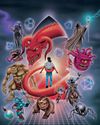
A ROUND THE one-year mark of the pandemic, my mother and sister and I began litigating who was missing out on more, from an important life-experience perspective. My sister was 24 when the whole thing started, so I nominated her. She didn't yet have a proper friend group set up in her city, and she hadn't had a chance to establish herself at work-neither of which seemed likely to happen from the living room. My mom was missing 57, which didn't seem horrible, but, as she said, every year counts.
We agreed I probably was faring the best. I was 27. I'd lived with my boyfriend for more than a year in an apartment beneath a close friend's. We didn't have children. In fact, I'd often sit on Zoom from my kitchen and watch my parent-colleagues less and less gently herd their toddlers offscreen and think, God, if there ever was the right time in my life for a global pandemic to strike, this would be it.
Three years and more than half a dozen variants later, I began to reconsider. Reemerged, I found strangers and friends alike were exceedingly curious about various new topics like, Did I happen to know a wedding venue in Brooklyn suitable for 150? And did I think I'd ever consider moving outside the city? Seven times in a two-month period, I was asked if I'd be freezing my eggs. All of which seemed strange, because-well, I hadn't yet realized I'd turned 30.
That COVID warped our perception of time is well established studies show that stressful experiences tend to make it feel unclear how much time is passing, especially when one is confined to one's home for months on end. It felt fast, it felt slow, it's now hard to remember at all. With some time and space from that urgent, panicked period (did that happen yesterday or the day before? How long has it been since I've seen another person?), some new questions have started to come up. Like, if we slept through three years of normal life development, how old are we exactly?
Denne historien er fra September 11 - 24, 2023-utgaven av New York magazine.
Start din 7-dagers gratis prøveperiode på Magzter GOLD for å få tilgang til tusenvis av utvalgte premiumhistorier og 9000+ magasiner og aviser.
Allerede abonnent ? Logg på
Denne historien er fra September 11 - 24, 2023-utgaven av New York magazine.
Start din 7-dagers gratis prøveperiode på Magzter GOLD for å få tilgang til tusenvis av utvalgte premiumhistorier og 9000+ magasiner og aviser.
Allerede abonnent? Logg på

LIFE AS A MILLENNIAL STAGE MOM
A journey into the CUTTHROAT and ADORABLE world of professional CHILD ACTORS.

THE NEXT DRUG EPIDEMIC IS BLUE RASPBERRY FLAVORED
When the Amor brothers started selling tanks of flavored nitrous oxide at their chain of head shops, they didn't realize their brand would become synonymous with the country's burgeoning addiction to gas.

Two Texans in Williamsburg
David Nuss and Sarah Martin-Nuss tried to decorate their house on their own— until they realized they needed help: Like, how do we not just go to Pottery Barn?”

ADRIEN BRODY FOUND THE PART
The Brutalist is the best, most personal work he's done since The Pianist.

Art, Basil
Manuela is a farm-to-table gallery for hungry collectors.

'Sometimes a Single Word Is Enough to Open a Door'
How George C. Wolfein collaboration with Audra McDonald-subtly, indelibly reimagined musical theater's most domineering stage mother.

Rolling the Dice on Bird Flu
Denial, resilience, déjà vu.

The Most Dangerous Game
Fifty years on, Dungeons & Dragons has only grown more popular. But it continues to be misunderstood.

88 MINUTES WITH...Andy Kim
The new senator from New Jersey has vowed to shake up the political Establishment, a difficult task in Trump's Washington.

Apex Stomps In
The $44.6 million mega-Stegosaurus goes on view (for a while) at the American Museum of Natural History.